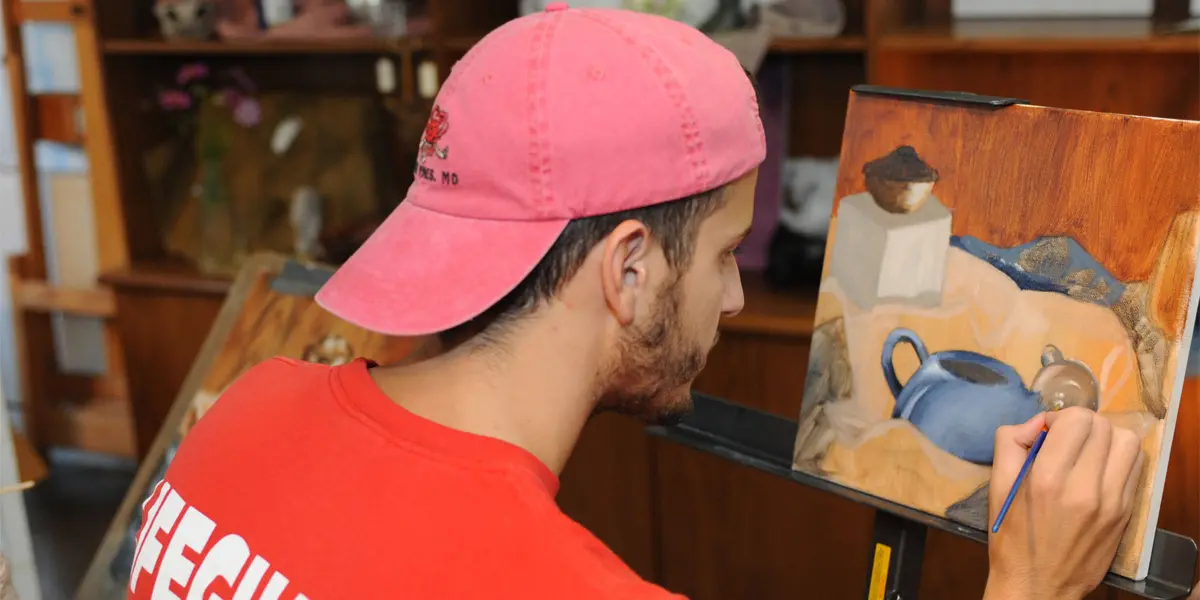Art Education
- Bachelor of Arts

-
In This Section
The Art Education Major is an intensive degree program that prepares students to teach in K-12 settings. Students build skills in many materials through hands-on assignments that include painting and drawing as well as fibers, ceramics and stained glass. Students also take courses in the education department, student teaching and prepare for Praxis exams required to teach in the state of Pennsylvania that is also accepted in other states.
In the Art Education program, there are many opportunities to engage in the arts beyond the classroom, such as:
- The proximity to Pittsburgh, which allows students access to nationally-recognized artistic organizations.
- The Verostko Center for the Arts, which hosts temporary exhibitions of regionally and nationally recognized artists and the senior exhibitions of graduating art students.
- The Foster and Muriel McCarl Collection of 19th-century American coverlets (housed in the Fred Rogers Center) is an important resource for American craft and history.
Undergraduate Programs
Undergraduate Admission
Phone:
800-782-5549
Ext. 2500
Email:
admission@stvincent.edu
What Can I Do With a Major in Art Education?
Students who successfully complete their Art Education degree and certification program will have received all of the necessary preparation needed to become a certified K-12 art teacher in the Commonwealth of Pennsylvania.
Because the higher-paying teaching jobs are given to those with master’s degrees, it is recommended that graduates of the program continue their visual arts education by entering a master of fine arts program, whether while working as a teacher or directly after graduation.
Curriculum Requirements
-
Requirements for a Bachelor of Arts Degree in Art Education
Required courses (33 credits)
AR 101 Art History I: Ancient through Renaissance - 3 credits
AR 102 Art History II: Baroque to the Present - 3 credits
AR 130 Drawing I - 3 credits
AR 131 Design: Two-Dimensional - 3 credits
AR 135 Design: Three-Dimensional - 3 credits
AR 225 Painting I - 3 credits
AR 230 Drawing II - 3 credits
AR 240 Sculpture I - 3 credits
AR 325 Painting II - 3 credits
AR 336 Sculpture II - 3 credits
AR 405 Senior Exhibition and Professional Seminar - 3 creditsOne course selected from (3 credits)
AR 205 World Art History - 3 credits
AR 310 American Art and Architecture - 3 creditsTwo courses selected from (6 credits)
AR 212 Beginning Black and White Photography - 3 credits
AR 233 Drawing and Illustration for Design - 3 credits
AR 234 Introduction to Stained Glass - 3 credits
AR 236 Fiber Art - 3 credits
AR 238 Clay and Pottery - 3 credits
AR 330 Digital Photography and Post-Production - 3 credits
AR 333 Advanced Photography - 3 credits
AR 338 Printmaking I - 3 credits
AR 348 Printmaking II - 3 credits
CA 235 *Introduction to Web Design - 3 credits
CA 285 *Electronic Media - 3 credits*Course description can be found listed in the Department of Communication.
In addition to the requirements above, Art Education majors seeking certification must also complete the requirements set by the Department of Education. Each student needs to see the Education Department for acceptance into the certification program and receive advising for the particular education courses needed.
Some students elect to complete their degree in Art Education before finishing the requirements for certification. If this route is chosen, the student must continue course work after graduation to complete their teaching certification requirements. The Art Education major demands a heavy course load; good communication between the student and advisers is critical.
-
Prerequisites
A portfolio review is required for admission to the Art Education major.
Please contact Ben Schachter, Chairperson, M.F.A./M.S., art history and studio art, for portfolio requirements.
Program Highlights
Results
Art education majors learn to understand discipline-based concepts such as composition, expression and iconography, are able to offer constructive criticism to their peers, acquire basic facility in a broad range of media and research methods and are familiar with career paths. Experiential learning is available on campus at the Verostko Center for the Arts, the Foster and Muriel McCarl Collection of 19th-century American coverlets, and an extensive collection of art on view throughout the College. Museums and galleries in Greensburg and Pittsburgh are easily accessible. Art education majors whose goal is seeking certification to become teachers must also complete the certification requirements set by the Department of Education, either before graduation through a cooperative program with the Department of Education, or following.Student Learning Outcomes
Students will:
- analyze the artistic styles of the Western tradition and at least one style from the non-western traditions.
- apply vocabulary related to making art.
- use a variety of materials and techniques, including digital tools.
- apply professional standards of exhibition and portfolio development.
- develop their observational skills shown by their use of a representational style.
Undergraduate Programs
Undergraduate Admission
Phone:
800-782-5549
Ext. 2500
Email:
admission@stvincent.edu
